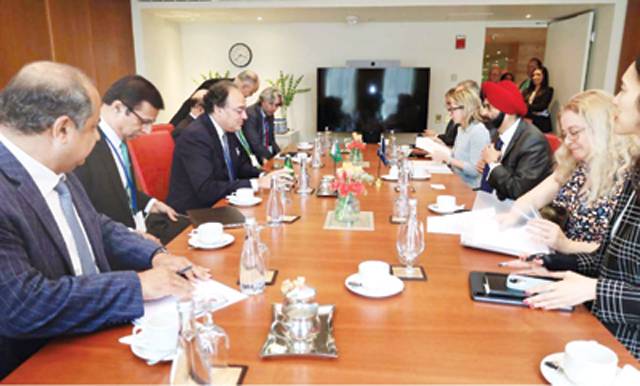WASHINGTON - Leading global financial organizations like the World Bank (WB), Asian Development Bank (ADB) and International Finance Corporation (IFC) have assured their support for Pakistan’s initiatives aimed at economic stabilisation through structural reforms, digital transformation and privatization efforts.
The assurance came during sidelines meetings of Federal Minister for Finance and Revenue Muhammad Aurangzeb, who is leading a Pakistan delegation in the IMF and World Bank-2024 Spring Meetings in Washington DC, with heads and representatives of the global lending institutions. Talking to WB Group President Ajay Banga, the finance minister appreciated the bank’s continuous support to Pakistan in implementing its development agenda, highlighting the government’s commitment to advance significant reforms in taxation, energy and privatization sectors. He underscored the importance of digital technologies to enhance governance and public service delivery, and asked the government was keen to work closely with the Bank to pursue the revenue reform agenda as well as timely investment in critical areas to help improve the domestic revenue mobilization. Both sides agreed on the need for a rolling Country Framework Plan for 10 years.
Ajay Banga assured his full support for Pakistan’s reforms and digitalization programs to stabilize the economy. During a meeting with WB Senior Managing Director Axel Van Trotsenburg, Finance Minister Aurangzeb discussed the bank’s support and engagement with Pakistan. The meeting explored the option of maximizing Regional IDA resources for development projects in Pakistan including flood-affected areas, agreeing to use the story of effective utilization of Pakistan IDA resources more effectively and benefit from the Knowledge Centre of the bank. The finance minister extended the invitation to the President to visit Pakistan at his earliest convenience. Muhammad Aurangzeb, in his meeting with President of Asian Development Bank Masatsugu Asakawa,, appreciated ABD’s partnership with Pakistan to support its development agenda and address its emerging needs. The finance minister highlighted the importance of ongoing projects and future collaboration, emphasizing the important role ADB’s support played in addressing macroeconomic imbalances, stabilizing the economy, boosting growth and achieving sustainable development.
ADB President Masatsugu Asakawa reaffirmed the bank’s commitment to support and assist Pakistan and expressed keen interest in working together to promote long-term, sustainable development in Pakistan. In his meeting with Hela Cheikhrouhou, Regional Vice President for MCT, at the International Finance Corporation (IFC), the finance minister briefed her on the government’s structural reform agenda focused on taxation, energy and privatization. He appreciated IFC’s efforts in enhancing the investment climate in Pakistan, particularly their support in improving national and provincial ease of doing business rankings and meeting universal financial access targets.
Aurangzeb encouraged IFC to scale up its engagement and work with Pakistan in the priority areas of securitization of remittances, mining, airport management and capacity building. Cheikhrouhou expressed her keen interest in furthering IFC’s collaborative efforts, emphasizing the importance of tailored financial solutions to support sustainable development in these sectors. Finance Minister Aurangzeb also met with CEO, U.S. International Development Finance Corporation (DFC) Scott Nathan, highlighting his government’s commitment to attract investments across various sectors in Pakistan, including priority areas of agriculture, IT, extractive industry and renewable energy.
He hoped that the DFC would expand its portfolio in Pakistan following the resolution of outstanding issues and tap the significant investment opportunities by leveraging private-sector investments and public-private partnerships. He also requested DFC’s assistance in the areas of debt financing, political risk insurance and capacity building to develop and implement potential DFC projects. Nathan appreciated the progress made by Pakistan under the structural reforms agenda leading to macro-economic stabilization, emphasizing the importance of continuing to build on existing investments, while at the same time pursuing new opportunities.
On the sidelines of the IMF and World Bank-2024 Spring Meetings, finance minister attended the G-24 Finance Ministers and Central Bank Governors’ Meeting and held important discussions on sustainable and inclusive economic growth and financial stability. He appreciated the ongoing support provided by the IMF and World Bank to Pakistan to stabilize its economy. The minister highlighted that the government undertook difficult but necessary reforms to move the economy in the right direction. He underscored the need for enhanced private sector engagement, terming it crucial for driving economic growth and innovation. Aurangzeb also highlighted the adverse impact of climate change on developing countries, including Pakistan and stressed importance of leveraging Adaptation Fund to implement effective mitigation and adaptation strategies.
In his meeting with Mohammed Al-Jadaan, Finance Minister of Saudi Arabia, the finance minister expressed gratitude for Kingdom’s steadfast financial support to Pakistan in times of economic challenges. Both sides exchanged views on deepening economic and investment relations between the two countries. They also explored new avenues for collaboration to further strengthen trade and investment ties in diverse areas.






